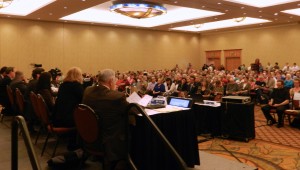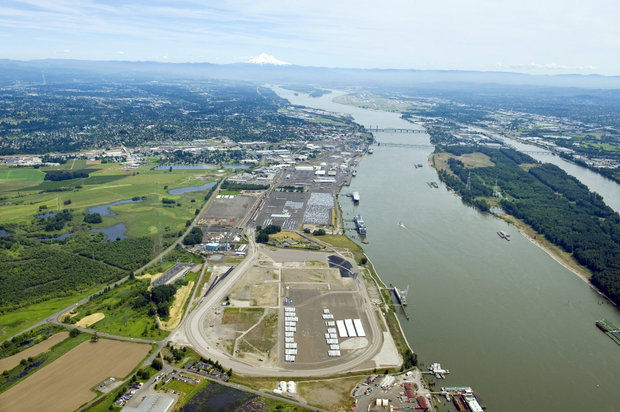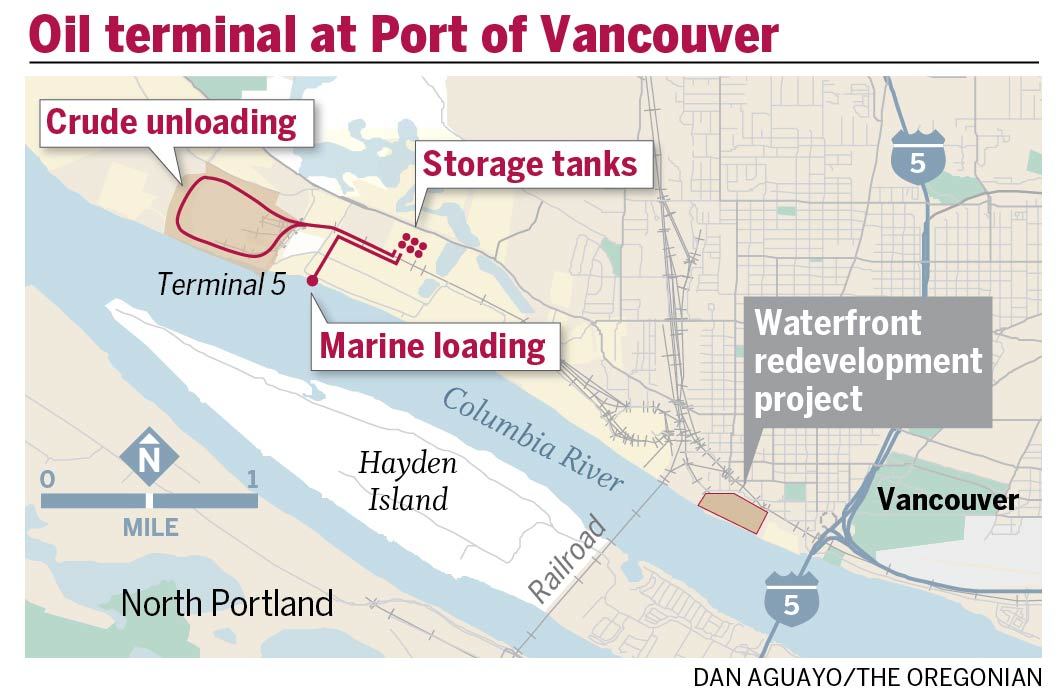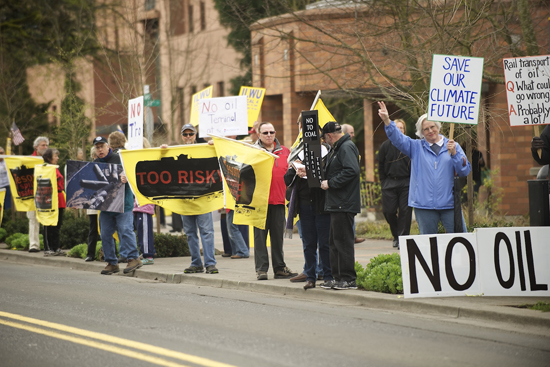
By Cassandra Profita, OPB
Monday night had turned to Tuesday morning by the time the Vancouver City Council voted to pass a non-binding resolution opposing what would be the Northwest’s largest oil-by-rail shipping facility.
The vote was 5-2 with Mayor Tim Leavitt and Councilor Bill Turlay dissenting. It followed six hours of testimony from residents, most of them opposed to the Port of Vancouver’s planned facility that would transfer North Dakota crude oil from trains to ships bound for West Coast refineries.
It was after 1 am when City Councilor Bart Hansen made a motion to pass the resolution, which expresses deep concern about rail safety, oil spills and explosions and urges Washington Gov. Jay Inslee not to approve the Tesoro Savage oil terminal.
The council debated whether or not to take the vote in the wee hours of the morning. Turlay said he wasn’t ready to take action. Leavitt said he wanted to make some changes to resolution before voting.
“I’ve been told nothing good happens after midnight,” Leavitt joked in pushing to delay the vote. “I know there are ways to improve the resolution. I hope we can get to a unanimous vote. Certainly, I’m not supportive of it as it is now.”
But other councilors pushed ahead. Councilor Anne McEnerny-Ogle said two-thirds of the testimony and comments she’s heard are from people opposed to the project.
“When I look at all the different e-mails that have come back, the voice says that for this community, this doesn’t work for us.”
Big Crowd Dwindles
By the time the board voted a crowd that had started out in the hundreds had dwindled to a few dozen.
More than 170 people signed up to testify at the hearing. At 11 p.m., more than four hours after the hearing began, the council voted to extend the meeting even later to take additional testimony. By 1 am, the council had heard from 101 people.
Even before the resolution was formally taken up, a majority of the city council had voiced opposition to the Tesoro-Savage oil terminal.
The hearing addressed two resolutions on the terminal, but most residents came to talk about the one that opposes the project as a whole. That resolution asks the Port of Vancouver to cancel its lease with Tesoro-Savage and urges state agencies and Washington Gov. Jay Inslee not to approve the project. It also supports new laws and regulations to improve crude oil transportation safety.
The council unanimously approved a resolution that calls for the city to play a bigger role in the state’s Energy Facility Site Evaluation Council review process.The council is in the midst of completing an environmental review of the project and is tasked with making a recommendation to Washington Gov. Jay Inslee, who has the final say. That resolution supports the city’s intervening in that process by presenting evidence to the state council, making arguments and appealing a decision to approve the oil terminal.
Most who testified Monday night voiced support for both resolutions and opposition to the oil terminal, although there were many who spoke on behalf of project backers Tesoro Corp. and Savage Companies.
Emotional Testimony
The resolutions drew some emotional testimony from both sides.
Don Orange, owner of Hoesly Eco-Automotive of Vancouver, told the council that he’s angry about the prospect of “thousands of pounds of filth” coming into his neighborhood and hurting his business.
“You can call this a terminal. To me, it’s a toilet,” he said. “It’s coming in here on a freight train and we’re flushing it off into ships. This small businessman thinks it stinks.”
On the other side, Port Commissioner Jerry Oliver expressed sadness that the council would consider opposing the project he thinks will benefit the country as a whole by distributing more domestically produced oil to U.S. refineries.
“It makes me sad, not so much that you’re turning your back on the Port of Vancouver, but that you have so little faith in our ability as a community to make this happen,” Oliver said.
Safety And Business Concerns Raised
The Tesoro Savage oil terminal would transport up to 380,000 barrels of crude oil a day. The oil would come from North Dakota’s Bakken fields by trains, be transferred to vessels on the Columbia River and then shipped to West Coast refineries. It’s the largest oil terminal project among the several proposed in the Northwest.
While project supporters noted that the city council doesn’t have the authority to stop the project, opponents of the project said it’s important that the city council let the governor know where it stands.
“It’s difficult to imagine the governor supporting this project if the city of Vancouver opposes it,” said Clark County resident Don Steinke after presenting the council with a box of 2,000 signatures in support of the resolutions.
Vancouver resident Carol Rose says she’s worried about safety in her community if the proposed project is built.
“It’s a tremendous amount of oil, and it’s a danger,” she says. “I’ve lived here for 40 years. I don’t want to have to move because of this.”
Many project opponents voiced concern about the risk of oil train derailments and explosions like the one that killed 47 people in Lac-Megantic, Quebec, last year.
Project supporters defended the safety record of Tesoro Corp. and Savage Companies. Earlier this year, Tesoro committed to using newer rail cars that meet higher safety standards.
Many who testified in support of the project were employees of Tesoro Corp. and Savage Companies. They told the council that they appreciate the jobs and economic development the oil terminal would bring to the area and vouched for the companies’ track records in treating their employees well.
Jared Larrabee, general manager for Tesoro, said the resolution opposing the project is premature because the Washington Energy Facility Site Evaluation Council hasn’t completed its environmental review.
“The resolution is making a predetermination without having all of the facts, in our view,” he said. “The resolution contains several inaccuracies and assertions that haven’t been validated by the forthcoming Environmental Impact Statement.”
He and other Tesoro representatives supported the resolution that would support the city intervening in the state’s environmental review process. But they urged the council to delay its vote opposing the project or to reconsider it altogether.
Todd Coleman, director of Port of Vancouver, criticized the city’s resolution and said it would damage the port’s ability to do business.
“You can’t have it both ways,” he told the board. “You can’t have a thriving port and all the things that come with that success and then attempt to choose between cargo. A vote for this resolution is a vote against this community’s ability to attract private sector business.”



 4. The Port of Vancouver has kept secret key details about the terminal.
4. The Port of Vancouver has kept secret key details about the terminal. 
